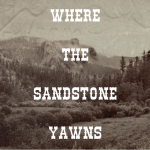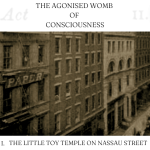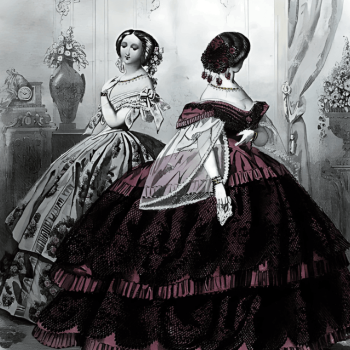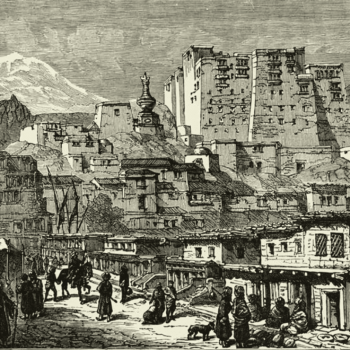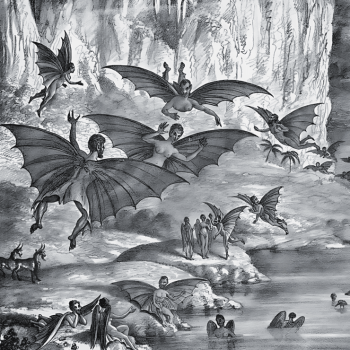SOUDAN
~
In February 1907, Irvine returned to New York from South. He was met with both encouraging and discouraging news regarding the progress of Socialism. The English economist, W.H. Mallock, was delivering a lecture series at Columbia University that was highly-critical of Socialism.[1] This would naturally influence the college men. If all went as planned, this would not be an issue for future college men (and hopefully women.) Frances Gill, head of a committee for the Socialist Sabbath School Association, opened the first “Socialist Sunday School” on February 2, at 337 East Broadway, the (headquarters of the New York Socialist Literary Society.) Gill took charge of the class and led the singing of the “Marseillaise,” and other revolutionary songs in which “capital was vanquished, and labor was the victor.” Fifty children of both sexes, listened as Gill told them that “labor is the producer of all wealth, and talked at length on the “evils of the capitalistic system.” After the school was dismissed, Gill told the press: “We are now mapping out a course of studies adapted to the intelligence of the children,” she said. “The course of instruction will, of course, be entirely secular. We are making our plans so as to have progressive lessons, and this will be simply a primary school of Socialism. The Socialist Sabbath School Association […] will organize similar schools all over the Greater New York.”[2]
Charles F. Powlison (Religious Secretary of the Young Men’s Christian Association) offered Irvine a commission from the Y.M.C.A. on West 57th Street to open up meetings in some of the shops and factories of New York.
“These meetings are in no sense sectarian,” said Powlison. “They are not conducted with any idea of inducing the men to join any specific organization. They are entirely democratic—workers are under no compulsion whatever to listen to the speakers. If the men want us to come, we are glad to come; if they don’t want us, we have no wish to force ourselves on them. Our sole object is to bring to men who otherwise might not search for it, the idea of a larger life of ethics, of the Kingdom of God— so presented as to give, no religious offence to anyone. We depend for our success on the ability of our speakers, and we send the best we have.”[3]
The overlap of religion and the secular world was much discussed at this time. Albert Lucas (Secretary of the Union of Orthodox Jewish Congregations of the United States and Canada,) criticized the New York Board of Education for allowing public schools to display Christmas Trees in the classrooms.[4] The Christian ministers of Brooklyn received a petition from Lucas regarding this issue with a request that it be signed and forwarded to the New York Board of Education.[5] Satisfied with the non-sectarian nature of the proposed talks, Irvine agreed. The Interborough Rapid Transit Company (the private company which operated New York City’s three-year-old Subway,) gave them permission to hold meetings in several of their largest shops.[6]
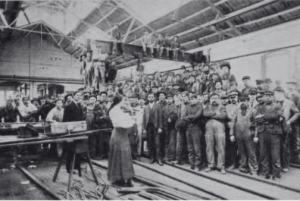
“The Lunch Hour in an Interborough Shop.”[7]
These big crowds of men in jumpers and overalls had a fascination for Irvine, and he enjoyed the job very much. The work in the Interborough went well, he gave the audience biographies of the world’s greatest men, and talked of ethics, science, art, and religion. His talks were never over fifteen minutes long (seldom over ten,) and he was always assisted by a musician of some sort.[8]
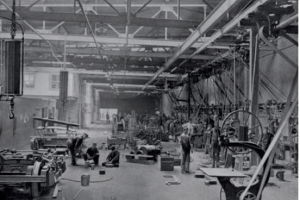
“Interior View of 148th Street Repair Shops.”[9]
~
Irvine was soon engaged by the Washington Heights branch of the Y.M.C.A. (155th Street and Broadway) to deliver a series of four special Sunday afternoon meetings for men.[10]
For his second talk, Irvine spoke of his experience in Sudan.
“The incarceration of Gordon in Khartoum was a matter of deep concern to every soldier and sailor in the British Empire, particularly to those of us who were in and around Egypt at the time,” Irvine began. “It has not always been plain to the British soldier in Egypt, why he was there; but he seldom asks why he is anywhere. In the matter of Gordon, however, the case was different. They all knew that Gladstone had sent him and refused to relieve him; at least, the relief was so long-drawn-out, so dilatory, that it was practically useless.
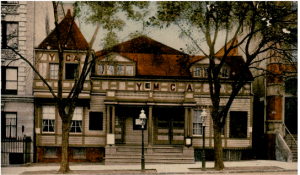
Washington Heights Y.M.C.A.
“I had made application for my discharge from the service by purchase—a matter of one hundred dollars—and had my plans made out for further study; but the plight of Gordon gripped me as it gripped others, and I determined to throw every other consideration aside, and get to the front. There was one chance in a thousand, and I took it. A marine officer of the ship was called for and his valet was a man who had almost served his time; had seen much service and was not at all anxious for anymore. I went after him, bank-book in hand.
“’I will give you all I possess if you will let me go in your place.’
“’It’s a go,’ said this man as a gleam of joy overspread his face. The officer himself was glad, and the whole thing was arranged; and in forty-eight hours, I was on board the Peninsula and Oriental steamship Bokhara bound for the Red Sea. The officer was the most brutal cad I have ever met. He strutted like a peacock, and seemed to take delight in humiliating, when an opportunity would present itself, anybody, and everybody beneath him in rank—he was a captain.
“The trip through the Suez Canal might be considered a new stage of development, for I travelled as a second-class passenger. To be consulted as to what I should eat or to have any choice whatever, was not only new, but startling. In turning a curve in the Canal, we encountered a sunken, water-logged ship which stopped the traffic. We were there four or five days, and the life of ease and luxury, with opportunity for reading and social intercourse with well-gowned people, was so enjoyable that, had it not been for the fact that Gordon was in danger in Khartoum, and I wanted to have a hand in his relief, I should have enjoyed staying there a month. We disembarked at Suakim on the Red Sea, and we were—the officer and myself—immediately attached to the staff of General Sir Gerald Graham in the desert.
“The seven months in the desert were months of waiting—monotonous, deadening waiting. The greatest difficulty of that period of waiting was the water supply. We were served out with a pint of water a day. Water for washing was out of the question. Our laundry method was a kind of optical illusion. We took our flannel shirts, rolled them up as tightly as possible, tied them with strings, and then thumped them laboriously with the butt end of a rifle; then they were untied, shaken out, brushed, and they were ready for use. Most of this was a make-believe laundry, but the brushing was real. Being attached to the General Staff, I had a little more leeway in the comforts of life, but it was mighty little.
“Off in the hills, ten miles distant, was encamped the black horde under Osman Digna, and every night of the seven months the Arabs kept up small-arm firing upon us. Sometimes they were bold enough to make an approach in a body in the darkness, but we had powerful electric lights that could search the desert for miles. We got accustomed to this after a while and would simply lie prostrate while the light was turned on them. Of course, the searching of the desert with the electric lights was always accompanied with the levelling of our artillery on whatever the light revealed. Not very much destruction was accomplished on either side, however. Occasionally a stray bullet would carry off one of our men in his sleep. Sometimes they would stealthily creep in upon our sentries and with their sharp knives would overpower them and mutilate them in an indescribable manner.
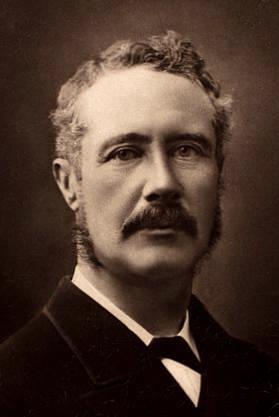
Charles Gordon.
“To prevent this, we laid dynamite mines in front of our encampments. I watched, late one afternoon, the young engineer officer as he connected the wires for the night—perhaps his hand trembled as he made connections, or perhaps some mistake was made. Anyway, there was an explosion. Great masses of desert sand shot into the air like a cloud, and when it fell again, the mangled body of the engineer fell with it; but the mines were laid, connections made for the night, just the same, by another engineer.
“At other places we had broken bottles fixed in the sand, for the black men came barefooted, and they were more scared by broken bottles in the sand than they were by the musketry fire.
“A night of great excitement was that of the capturing of some of our mounted scouts in a sortie near the hills. That night we saw half a dozen immense bon-fires on the hilltops, and the impression we got was that our comrades were being burned alive. There were half a dozen brushes or skirmishes with the natives during my stay in the desert, but I did not experience what might be called a decisive battle. There had been decisive battles of one sort or another, but I was not present. They were before my time.
“They began the laying of a railway from Suakim to Berber, but afterward they pulled the rails up. The soldiers cursed Gladstone for the laxity of his foreign policy. Gordon, we knew, was in Khartoum, and hard pressed, and outside were the Mahdi and his multitude; and why the Government should hold us back, we could not understand. The desert life was so deadening that any kind of a change would have been welcome. Every man would have been glad of even a repetition of the charge at Balaklava, though only few men would come out. Anything was preferable to rotting in the desert!
“The sun was striking dead one out of every two men. I thought my time had come when I had a sunstroke. Being the only man on the General’s staff stricken, I was well looked after. The General had ice, and I was privileged to have the luxury of it. I was also given a glass of the finest French brandy I asked the attendant to put it by my side, and when he disappeared out of my tent—my tent was so small that it barely covered my body — I went through a fierce battle with my prejudices. I was a fanatic on the drink question. I had sworn eternal hostility to it, and with good reason. The use of it was partly responsible for my lack of early schooling. It had robbed me of a great deal of the life of my kindhearted old mother, and I had determined to put up a tremendous fight against it. Here the thing was in my hands, ordered by the doctor; but I tipped it into the sand and made them believe that I had drunk it. I had seen so many stricken men with sunstroke die during the same day, that I had little hope of my own recovery; but inside of twelve hours, I was on my feet again, and, though weak, at work.
“It was recorded that we lost fifty per cent, of our strength by sunstroke and enteric fever. It was very noticeable that the men of intemperate habits were the first to go. They dropped like sheep in the heat of the day, and by sundown they lay beneath a winding sheet of desert sand. The actual conflict of civilized with savage forces was responsible for the loss of very few men. The sun was our arch enemy!
“To break the monotony, we tried whatever sport was possible in the sand. The national game, cricket, came in for a trial, but was more laughter provoking than recreative: a bundle of rags tightly rolled up in a sphere served as a ball, and pieces of boards of old packing-cases served as bats and wickets. Leapfrog and the three-cornered game of ‘cat’ were favorite pastimes, but nothing broke the monotony. It was depressing, and it was not an unusual sight to see men weeping from homesickness—utterly unable to keep back the tears. There were attempts at suicide also, and men eagerly sought opportunity to endanger themselves. Actual fighting on the desert was to us the greatest possible godsend, for it meant either death or relief from the game of waiting.
“Despite the fact that the love of Gordon had brought me there, I was not enamored of the way in which the campaign was carried on. Of course, when in actual conflict, I wanted this black horde wiped off the face of the earth; but when I saw boys and girls, ranging from six to ten years of age, approaching the phalanx of British bayonets with their little assagais ready to do battle, I was thrilled with admiration for them. Some of our officers described this as fanaticism, and I remember a discussion that took place between two of them as to whether it was fanaticism or courage, and a unique experiment was tried. We had with us always a contingent of friendly natives, and in order to test the question, one of them was to bare his back (for a shilling) and an officer applied to it, with all his strength, a horsewhip. I saw the black man’s body writhe for an instant as he puckered his mouth; but it was only for an instant—then he smiled and asked for another stroke for another shilling. This seemed to indicate to the officers that there was something more than fanaticism in the Sudanese. Their warriors were tall, powerfully built men—we used to say they were dressed in palm oil and mosquitoes. Their hair stood straight up, and their bodies were greased. I think it was the general opinion of our officers that if these men could be disciplined and drilled as European soldiers are, they would make the finest fighters in the world.
“There was somewhat of a mixture of my sentiment and feeling on this war. I wanted Gordon released, I wanted the war ended and the Soudanese beaten; but when I contrasted the spirit of the campaign with the spirit of Jesus, I often wished that I could lend my assistance to these black men of the desert who were fighting for the thing under their feet, and the home life of their tribe. But it was not until I was completely out of the desert that I was possessed of a loathing and disgust for the game of war, as such. This disgust grew until I had completely ridden myself not only of the war spirit, but of the paraphernalia of the soldier. The officer whose servant I was, was so hated by everybody who knew him that if he had ever gotten in front of the ranks, as was the ancient custom in war, he would have been the first man to drop, and he would have dropped by a bullet from one of his own men. But leaders no longer lead on the field of battle—they follow!
“I had some books with me, but the power to interest myself in them had almost completely vanished. I occupied my mind very largely with military tactics. On a large sheet of brown paper I outlined the plan of campaign. On it I had the position of every regiment in our army. The dynamite mines, the region of broken glass, the furze bushes, fort and redoubts were all minutely detailed, and one night an exigency arose in which this paper plan of campaign was called into evidence. Tired of waiting, and very restive and discontented under the privations of the desert, Graham determined to move. The electric-light apparatus was out of order, and the advance forts were too far away to be touched with any less powerful signal of the night. A non-commissioned officer was ordered to take a corporal’s guard and deliver marching orders to the advanced forts. When questioned as to the route he was not quite certain as to the exact location of the dynamite mines or broken glass, and as I overheard the entire conversation, I produced my brown paper map and begged the honor of carrying the dispatch. This was not granted me until several others had been questioned and failed. I was so sure of every inch of the ground, that I was commissioned to take two men with me and deliver the orders. This made my heart leap with joy—it was a relief, an excitement, an opportunity!
“Osman Digna’s men were stealthy. They hid behind the furze bushes in the darkness so often, and so many of our men had been hamstrung, that, of course, we were on the alert; but every furze bush we approached covered an imaginary ‘Fuzzy Wuzzy,’ and this, often repeated, created an unutterable fear, so that by the time we reached our destination, our khaki clothing was black with sweat, and we were literally drenched with fear. Of course, we put on a brave front and smiled complacently as we delivered the orders, and when it was suggested that we remain overnight in the fort, I nonchalantly refused the offer under the pretense that we were expected back. The same thing happened on the return journey, and when the thing was over, we were the most pitiful-looking objects—fear-stricken soldiers!
“Some months later when it was announced to me that we had been mentioned in dispatches, the absurdity of the thing became for the first time fully apparent. According to the ethics of military life, I had done a brave thing—something worth mentioning; but to my own soul, I had been panic-stricken with physical fear, and turn it over as I might, I could not discover a vestige of either courage or fortitude in the entire transaction.
“The phrase, ‘Everything is fair in love and war,’ covers a multitude of sins in both departments. We had a unique way of finding out whether the wells in the desert were poisoned. We led up to each well a small detachment of captives and made them drink. If they drank, we could drink also; if they refused, we took it for granted the wells were poisoned, and we hanged them. Sometimes this extreme sentence was mitigated, and we flogged them. Whatever we touched, we destroyed. What the bullet could not accomplish, the torch could. It was a campaign of annihilation!
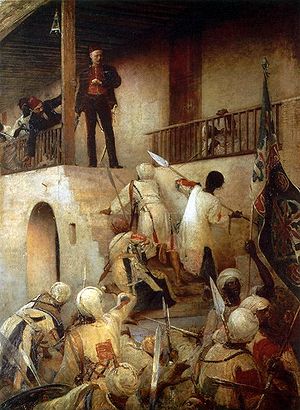
Battle of Khartoum.
“The news of Gordon’s death cast a gloom over the entire army. This, of course, meant relief and return home, but no man wanted to return. We were seized with a fiendish impulse to proceed at all hazards to Khartoum to his relief. That, from the point of view of the Government was, of course, out of the question, and we were ordered home. Transport ships were lying in Suakim harbor ready for the journey across the sea, but this could not be accomplished with dispatch. A garrison had to be left to watch the seaboard. The detachment of which I was a part was returned to the town of Suakim, and the officers were quartered in an unfinished building by the seaside at the edge of the water. The officers’ servants lived in tents pitched on the roof. We were permitted to bathe as often as we wished. The harbor was full of sharks and rather dangerous for bathing, but the Soudanese seemed to be not over-careful as they skimmed over the water in their ‘dug-outs.’
“The journey home on a transport was a continuation of the misery of the desert. What the desert had left undone to weakened men, the rough voyage accomplished. The ship was overcrowded and almost every day dead bodies lashed to planks were pitched over the side. The sight (below decks) of scores of men crawling around in a dying condition, struck terror to the hearts of the strong. The smells were nauseating, and the food was vile. No man knew when his turn would come. The few doctors were utterly unable to cope with this physical collapse of so many men.
“The condition of the ship and of the men furnished me with the best opportunity I had had up to that time for evangelistic work. I spent twenty hours of each twenty-four preaching the gospel to the men. The absence of a chaplain on board made the work comparatively easy. My work was done so quietly and unobtrusively, that it was practically unknown save to the sick and the dying until an incident happened that brought me somewhat into the light.
“We were in the Bay of Biscay, and those who were well were fighting off the atmosphere of disease. It was toward evening and four men were playing cards for money. I stood watching them with my hands behind my back. I must have been there half an hour when the man directly in front of me, looking around and staring me in the face, said:
“’Get t’ell out of ‘ere! I ‘aven’t won a penny since you’ve been watching us.’
“The other men laughed, and I moved away, excusing myself as I departed; but before I was out of hearing, one of the men addressed the speaker and said:
“‘Don’t be too sure of what you could do to that fellow Irvine — his looks belie him. He’s got more steam in his elbow than you have.’
“That was all I heard, but as I was looking over the side a minute or two later, a hand was laid on my shoulder. I looked around. It was the man who had threatened me.
“‘Say, pal,’ he said, ‘I didn’t mean no ‘arm. These ‘ere blokes tell me as yer name’s Irvine. Is that so?’
“I nodded an assent.
“‘Did yer ever ‘ave a chum ‘oose name was Creedan?’
“Again I nodded assent.
“‘D’ye know what became ov ‘im?’
“‘He was missing on the field,’ I replied.
“‘E’s dead,’ said the man.
“Then he described to me the last moments of my friend. It appeared that Creedan and this man fell together on the field, Creedan shot through the abdomen, this man, through the shoulder. An officer came along and offered Creedan a mouthful of water, but he refused, saying he was all in, but that he wanted to send a message to his chum, and this is the message he gave to the man who had threatened to punch my head:
“‘Tell Irvine the anchor holds!’
“I was moved, of course, by the recital of this story; so was the man who told it.
“‘What in ‘ell did ‘e mean by th’ anchor ‘oldin’ ?’ the man asked.
“‘Old man,’ I said, ‘I had been trying for a long time to lead Creedan to a religious life, and the story you tell is the only evidence that I ever had that he took me seriously.’
“The man looked as if he were going to weep, and in a quivering voice he asked if I could help him. He was going home to marry a maiden in Kent whom he described as ‘a pure good girl.’ He felt unworthy, for he was a gambler and a periodical drunkard, and he thought that if a man like Creedan could be helped, he could.
“I struck the iron while it was hot and said: ‘There is a good deal to be done for you, but you have to do it yourself! If you’ve got the grit in you to face these fellows and make a confession of religion right here and now, I will guarantee to you that you’ll land on the shores of England a new man.’
“He looked at me for a moment with a stern, hard face, then he said:
“‘By God, I’ll do it!’ There was no profanity in this assertion. It was the strongest way he could put it; and we dropped on our knees on the deck and began to pray. In a minute or two half a dozen others joined us. Then it seemed as if everybody around us was on his knees; and then, when I felt the atmosphere of the crowd and the reverence of it, I called on others to pray; half a dozen others responded, and then this man, above the roar of the wind through the sails and the creaking of the boats’ davits, prayed to God to make him a new man.
“Creedan had been drafted from the ship in a detachment for the front, and when we met on the desert, we entered into a compact which stipulated that if either of us fell on the field of battle, the survivor was to take charge of the deceased’s effects and visit his people.
“The arrival of the troops in England was the occasion for an unusual demonstration. We were banqueted and paraded, and all kinds of honors were showered upon us. As we marched through the streets in our sand-colored uniforms, we were supposed to be heroes—heroes everyone. What a farce the whole thing seemed to me! Nevertheless, I was inconsistent enough to actually enjoy whatever the others were getting.
“Having purchased my discharge by the payment of £20 I was at liberty to leave at my pleasure; I was offered a lucrative position in the officers’ mess which was one of the best in the British Army. This I accepted and held for a year.[11]
PEOPLE OF THE UNDERWORLD
I. INTERCOLLEGIATE SOCIALIST SOCIETY.
II. THE CRY OF PEONAGE.
III. MUCKERS.
IV. GALLAGHER’S HELL.
V. PUNK.
VI. SOUDAN.
VII. BOWERY.
VIII. “IT IS A BETTER FLAG THAN THE AMERICAN FLAG.”
IX. PENETRATING THE ASCENSION.
X. “THE UNIVERSE IS BASED ON THE SUBJECTION OF WOMAN.”
XI. PROGRESSIVE WOMAN SUFFRAGE UNION.
XII. THE CHRISTIAN SOCIALIST FELLOWSHIP.
XIII. THE ERUPTION OF THE END.
SOURCES:
[1] “Theories of Socialism.” The New York Tribune. (New York, New York) February 13, 1907.
[2] “Socialist School Started.” The New York Times. (New York, New York) February 3, 1907.
[3] “Noonday Shop Meeting.” The New York Tribune. (New York, New York) February 17, 1907.
[4] Bloom, Leonard. “A Successful Jewish Boycott of the New York City Public Schools—Christmas 1906.” American Jewish History. Vol. LXX, No. 2 (December 1980): 180-188.
[5] The petition said in part: “As American citizens, we believe in obedience to the law. Therefore, we indorse the present protest against religious celebrations, services, or exercises of any kind in our public schools. We understand that Hebrew Citizens request also that the Christmas tree be not permitted in school exercises at Christmastide. Whatever the Christmas tree was originally, it has come to be associated with Christmastide, and is therefore, under the state law, forbidden. The law forbids the support of any school in which the religious doctrines or tenets of any particular Christian, or other religious sect shall be taught, inculcated, or practiced. The Christmas tree now stands aa a Christian institute, or symbol, and therefore it stands for Christianity. The schools are supported by taxation, to which Hebrews contribute. It is unfair and illegal to use funds which partly come from Hebrews, to support schools in which practices distasteful and objectionable to Hebrews, are allowed. It is unfair and un-American to make Jewish children attend exercises with features contrary to their religion. Furthermore, the spirit of Christmas is “peace and good.” If the Christmas tree creates, as it evidently does, friction and ill will, it is surely out of harmony with the spirit of the season and should therefore be excluded from exercises in our public schools. We, therefore, in the interest of true peace and good will, and in accordance with the dictates of true American citizenship, which teaches obedience to established law, respectfully request the Board of Education to obey the law, both in letter and in spirit, by forbidding hymns, pictures, recitations, Christmas trees, exercises, and everything of a religious character in our public schools.” [“Jews Ask Clergyman to Attack Christmas.” The Brooklyn Daily Eagle. (Brooklyn, New York) February 1, 1907.]
[6] Irvine, Alexander. From the Bottom Up: The Life Story of Alexander Irvine. Gosset & Dunlop. New York, New York (1910): 247-248.
[7] Irvine, Alexander. From the Bottom Up: The Life Story of Alexander Irvine. Gosset & Dunlop. New York, New York (1910): 248.
[8] Irvine, Alexander. From the Bottom Up: The Life Story of Alexander Irvine. Gosset & Dunlop. New York, New York (1910): 247-248.
[9] Rare Book Division, The New York Public Library. “Interior view of 148th Street repair shops.” The New York Public Library Digital Collections. 1904. https://digitalcollections.nypl.org/items/510d47dc-9bbd-a3d9-e040-e00a18064a99.
[10] The first of these weekly lectures began on March 3, 1907 and concluded on March 24. (March 10) “Religion and Life in the Soudan.” (March 17) “All Sorts and Conditions of Men on the Bowery.” (March 24) “How I Won a Medal from the Queen.” [“Y.M.C.A. Notes.” The New York Tribune. (New York, New York) March 2, 1907; Y.M.C.A. Notes.” The New York Tribune. (New York, New York) March 9, 1907.]
[11] Irvine, Alexander. From the Bottom Up: The Life Story of Alexander Irvine. Gosset & Dunlop. New York, New York (1910): 63-77.


